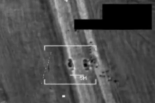9.51 pm. Here’s the best rationale I can think of for what the president has just announced. If we simply left ISIS alone, there’s a real danger that it could begin to organize in such a way as to threaten the US. That in itself reveals the craven dependency that the regional powers still have with respect to this kind of Salafist fanaticism – but it remains a fact. We can do a few things from the air to make ISIS’s life a lot harder, and hope to God that yet more American bombs in Iraq won’t go astray or provoke an even more intense reaction. Maybe the non-Salafist Syrian opposition can get its act together, but maybe it can’t. At best, the strategy is simply to try to contain ISIS with airpower. And that’s basically it. Another Sunni Awakening? That’s the hope. But at this point it’s surely just a hope.
So this is really a police action which does not end crime, cannot apprehend the criminals but can keep the criminals from getting a firmer footing for a while. As long as we are cognizant of that, we can judge its relative success or failure. But it contains no inkling of what the unintended consequences will be, leaves Obama open to even more pressure to send ground troops in if things go South, and allows the Congress to shirk any responsibility to declare war. Apart from all that, it’s brilliant.
9.42 pm. Notice a few salient things: the utter vagueness of the end-game; the refusal to go to Congress for a new war; not even a gesture toward telling us how we actually pay for this amorphous thing (with the Republicans suddenly losing any interest in the debt); no real sense of whether the Iraqi and Syrian forces can really fight ISIS, with or without US air support; and the grand coalition of Sunni Arab states … well, it looks like the Saudis may be rattled enough to help – but you don’t hear a peep from the Gulf states or Jordan.
This is an almost text-book case for not starting a war. I have come to the conclusion that the administration saw a kind of tipping point on the ground with ISIS, has no real solution, and improvised this strategy on the fly. And as far as the model in Yemen and Somalia, well …
SOMALIA is our model???? So what, we’re going to attack ISIS until an even more extremist youth wing takes over??
— Stephen Smith (@smithsj) September 11, 2014
And:
#Yemen is in midst of 3 civil wars closing in on capital, but it is model for successful US military intervention?
— Sarah Leah Whitson (@sarahleah1) September 11, 2014
And the beat goes on …
9.37 pm. Hard to disagree:
Obama’s saying we’re going play terrorist whack-a-mole indefinitely. Yemen and Somalia for years and years, now Iraq and Syria too.
— Daniel McCarthy (@ToryAnarchist) September 11, 2014
Now, Obama has never denied he is prepared to wage a long war of attrition against Islamist terrorism. So it is not exactly a U-turn to target ISIS the way we targeted al Qaeda in Af-Pak. But if you do not buy the idea that mere force works against Islamist terror – because in a terror war, force can actually embitter and create as much terrorism as it prevents – then this is a grueling conclusion. It means a state of permanent warfare. It sets a precedent that the US can be baited into this kind of action by any two-bit Jihadist with a social media account and a few scary videos.
Do we think American bombs raining down on Iraq again will win us friends? Apparently we do.
9.36 pm. Tweet of the night:
Meet the new war, same as the old war.
— God (@TheTweetOfGod) September 11, 2014
9.30 pm. So here we are. The strategy is not to defeat a direct threat to the United States, because there is no such threat at present. The strategy is to contain ISIS through US airpower, the Kurds, the Iraqi “Army”, and by trying to get the Saudis to work the tribes to turn a critical mass of Iraqi and Syrian Sunnis against the Salafists and toward Baghdad. I presume air-strikes in Syria will be designed to cut off ISIS’ supply lines across the now non-existent border. I don’t doubt there will be special forces on the ground.
There will also be old-school American service-members on the ground in Iraq to help train the Kurds and the central government forces. Somehow, along (one presumes) with massive bribes as during the first “Awakening”, this will turn the tide.
I found the president to be calm and assured. But, to be honest, the final pep-talk about America was unnecessary, even tone-deaf. Who can believe America is a force for good in that part of the world when we have just blown the whole place up – and left a failed state in our wake? And the president still seems to convey an impression that those rescued from ISIS will somehow be grateful to the US for standing up for civilization and its values. They won’t be. They’ll hate us, whatever we do – but especially when we intervene. One obvious factor missing: the Iranians – many of whom apparently believe that ISIS is America’s creation. But the Iranians could scramble the sectarian balance here – but seeming to be a Shiite force of exactly the kind that spawned support for ISIS in the first place.
I don’t buy this as in any way guaranteeing the demise of ISIS; to analogize this war to Yemen and Somalia – where the president’s glib declaration of success doesn’t exactly evoke confidence – is to miss the obvious point that the US created the nightmare in Iraq from 2003 onward. This is a continuation of the same war, with the exact same tactics used by Petraeus to bribe, organize and arm Sunnis repelled by ISIS. But this time, we have no troops on the ground. And the Sunnis are even more pissed off now than they were then. And our credibility is in the toilet. And our levers are weaker. And the multi-sectarian government just barely formed has not even come close to proving its inclusive potential.
I wanted to be reassured. Alas, I’m not.
































